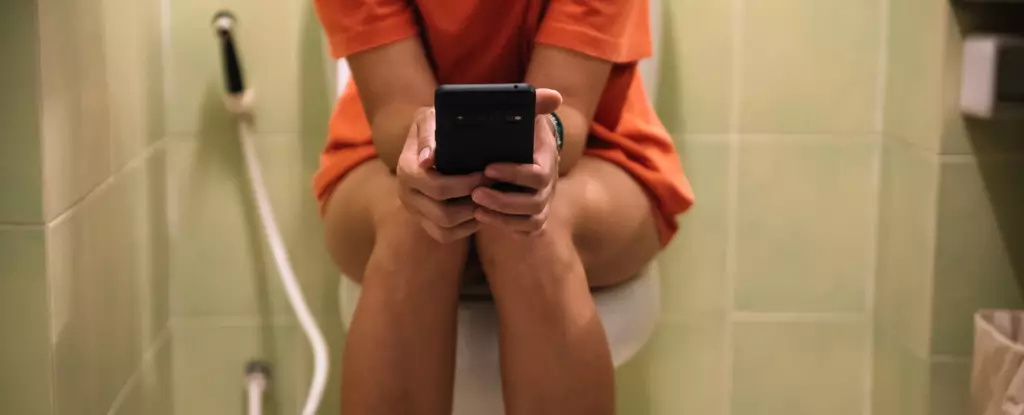In today’s digital age, our smartphones have infiltrated every aspect of our lives, including some of our most private moments. One such moment is undoubtedly our time spent on the toilet—once a place for contemplative solitude or a quick read, now transformed into a digital playground. While we may think that scrolling through social media or catching up on the latest news is a harmless diversion, emerging research reveals alarming consequences. A recent survey indicated a shocking 46% increased risk of hemorrhoids among phone users on the toilet. The implications of this data raise serious questions about our increasingly lengthy bathroom routines and the role of our beloved devices.
The Hidden Impacts of Extended Sitting
It’s easy to underestimate how seemingly innocuous habits can have detrimental effects on our bodies. The survey, presented at the Digestive Diseases Week conference, highlighted that more than 40% of participants had hemorrhoids, many of whom confessed to spending excessive time on their smartphones while sitting. This behavior may seem trivial, yet it exemplifies a larger trend: we’re allowing our devices to dictate the duration of our bathroom trips. While only 125 individuals were surveyed, they clearly point to a pressing health issue. Prolonged sitting can lead to excessive pressure in the lower rectal region, compounding the possibility of developing hemorrhoids. Doctors recommend limiting toilet time to under 10 minutes—ideally 3 minutes for those already suffering—yet many of us exceed these limits, unwittingly weakening our vascular health.
More Than Just a Bathroom Issue
The significance of hemorrhoids in our healthcare system cannot be overstated. Almost 4 million doctor visits in the United States each year are attributed to this condition, which has remained largely misunderstood. The absence of updated national data since 1989 makes it difficult to grasp the full scale of the issue, even as anecdotal evidence mounts around the harms of an elongated toilet time influenced by smartphone distractions. These clusters of blood vessels may be commonplace, but when they cause discomfort or pain, people suffer. Hence, our modern habits, entwined with technology, are leading us to neglect timeless wisdom about bodily health and hygiene, signaling a need for critical discourse surrounding the risks of our evolving lifestyles.
Colonial Practices vs. Modern Distractions
Interestingly, reading on the toilet is not a new practice. Historical accounts suggest that colonial America saw people using newspapers for hygienic purposes. Fast forward to the present, and while we still find solace in reading while in the bathroom, our tools for entertainment have become far more engaging—and distracting. Smartphones can zap our attention span and derail our focus from bodily functions that require simplicity and ease. As detrimental as it may seem, the way we utilize technology during these moments has been shown to interfere with our fundamental bodily goals.
Setting New Boundaries
So, what can we do to curb this troubling trend? Experts recommend that we reassess our relationships with technology, particularly in destined areas like the restroom. The notion of a “smartphone-free zone” has emerged as a resolution worth considering. By establishing boundaries around our bathroom usage—perhaps even designating this space as one for privacy and mindfulness rather than digital distractions—we could reclaim our natural rhythms. The time we spend in this sacred place should be about self-reflection, not mindless scrolling.
A Call for Consciousness
It’s crucial to recognize the pivotal role that our behaviors play in shaping our overall health. Microhabits, such as how long we linger in the bathroom with our smartphones, might seem trivial but can lead to serious repercussions. We must foster a health-conscious dialogue concerning our habits and re-evaluate our routines. Going “number two” should prioritize indeed, rather than becoming a mere extension of our online personas.
As we embark on this journey to reevaluate our bathroom break priorities, let us challenge the way technology occupies even our most intimate moments. It’s time to return to a model of self-care that champions health over distraction, sanity over scroll.

